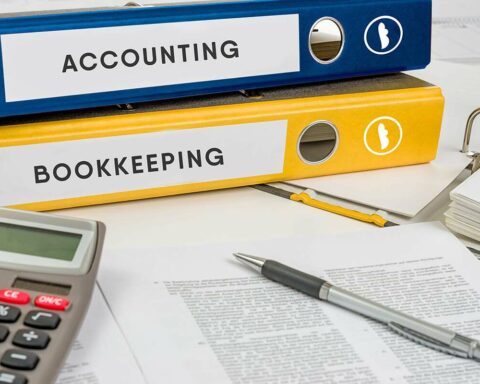Maintaining an account for any business is not an easy task. Even small businesses irrespective of their size, face the challenge to keep track of bills, sales, and expenses altogether. Small businesses may be a one-man show, which leads to an assortment of things, making bookkeeping and tracking transactions quite tricky.
It is important for business owners to have basic accounting knowledge so as to manage their business better. Bookkeeping is a key to keeping exact financial records. Bookkeeping will save you from driving yourself a loss at the year-end.
What is bookkeeping?
Bookkeeping is the recording of day-to-day tasks such as financial transactions, and information relating to a business. Correctness is vital to this process. Many companies are able to track the information in its book to make key operating and taking financing decisions.
Bookkeepers are the individuals who manage to record all the financing data as well as information for companies. Without bookkeepers, an organization will not be aware of its present financial status with all the financial transactions occurring within the company.
Tracking the financial activities of a business is the main purpose of bookkeeping as it lets you keep up-to-date records of the current incoming as well as outgoing amounts imposed by customers and by the business.
Importance of bookkeeping
Bookkeeping helps you to prepare your budget, tax returns and so more. Bookkeeping deals with the financial aspects of a business. It helps your business to effectively accomplish cash flow, plan for the future, and be well-informed about the running status of the business. Here I am discussing various importance of it:
Budget properly:
As bookkeeping keeps your income as well as your financial expenses properly organized, it will be easy to review your financial costs and resources.
A budget shows you the path of your financial incoming and outgoing. With a budget, you can prepare your future expenses for your business and that will be beneficial for the growth of your business.
Maintains organized records:
Bookkeeping maintains the daily financial activities of your business in an organized way. So if you are searching for a crucial piece of your business, it will make it much easier to find the bits of information on time.
Every business wants to grow but poor financial records can be a barrier from happening at the speed you want.
Helps you to Prepare taxes:
Every business needs to file its taxes at the end of a financial year. With a bookkeeping process, you can easily find the information ready for the tax sessions.
With bookkeeping, you will predict the outcome more accurately as you have a detailed balance sheet over time.
Managing cash flow:
Tracking the cash flow of your business is an important aspect of your business. It is possible only when the business follows the proper guideline to record the financial data effectively through bookkeeping.
Bookkeeping depicts the source from where the cash is coming and where the cash is spent, so bookkeeping is very much effective to make the cash flow management of your business.
What exactly does a bookkeeper do?
The responsibilities of a bookkeeper include providing accurate, up-to-date financial information about a business. This also involves a fair bit of data entry, and receipt arguing. Their report more often goes to the managers and owners to make some decisions involving strategy development.
Typically, bookkeepers are responsible for building four key financial statements:
- Income statement: This shows your revenue and expenses for a specific period of time. This statement is also called the profit and loss statement
- Cash flow statement: this is a record of entering and leaving cash and cash-like equipment in your company.
- Data entry: Recording all the financial transactions and balancing the books.
- Bank reconciliation: Cross-checking the books against bank statements and other source documents to confirm correctness.
Some more additional duties of a bookkeeper in a company are as follows:
- Tax filing
- End of the year reporting
- Payroll
- Training
- Business strategy
- Business process

What are basic bookkeeping skills?
To become a bookkeeper you can acquire skills through self-study, or pursue an internship so that you can learn in a structured environment. During this learning period, you can learn basic bookkeeping principles. So, find out these specific skills that can help you in a bookkeeper career:
Attention to Details:
This quality is interconnected to your sense or organization. Attention to detail helps in to become accurate while handling their company’s financial data. It is essential so that a bookkeeper can prevent issues or mistakes that can hamper the business’s accurate record.
Integrity and transparency:
A bookkeeper is the main source of the information for most people working in a company they are keeping their complete faith in your ability. The data you are providing may be very confidential so keep them that way also keep a transparent approach to your coworkers.
Invoicing:
Invoicing is another important skill every bookkeeper should have as it refers to listing transactions and detailing each charge on a bill. They should be able to read the invoice to understand a transaction between buyer and seller. The ability to prepare, comprehend and interpret invoices allows a bookkeeper to track revenue entering a business and recognize existing payments
Spreadsheets:
A bookkeeper should be able to create a spreadsheet for day-to-day activities, they frequently use spreadsheets to record the financial data of an organization. Spreadsheet tools enable bookkeepers to build separate sections for different types of data as well as separate files for various components such as employee salary, accounts payable, etc.
Organizational skill:
As a bookkeeper of an organization, you will be received an enormous number of data that you need to organize over a short-time or long-time. Your coworkers will come with a number of questions assuming you to be the same sort of these problem solver. So, you must organize the records.
What does a bookkeeper do on a daily basis?
Since bookkeeping is a fundamental accounting process, you have to perform precisely all the bookkeeping activities daily. A bookkeeper works 40 hours per week and completes multiple tasks to modernize organizations’ financial and accounting systems. Bookkeepers perform many of the daily financial tasks including:
- Manage mails/emails
- Daily account management
- Record management
- Communicate daily
- Tax session preparation
- Revenue and expense management
- Payroll management
- Prepare reports
- Data entry

Bookkeeping vs. accounting: what’s the difference?
Bookkeepers and accountants both keep a company’s financial records. In present days, we are noticing a tendency to merge these two roles into one. Here, I am showing you where an accountant and a bookkeeper differ.
A bookkeeper is responsible to keep a record of a company’s financial activities whereas an accountant is responsible for classifying, interpreting, reporting, and summarizing the financial data. When it comes to decision-making, the management of a company cannot make a decision based on the data delivered by the bookkeeper.
On the other hand, accounting is the measurement, processing, and distribution of financial and non-financial data concerning organizations. Accounting measures the total outcome of the company and conveys this message to the management, investors, creditors, and regu8lators. Many accountants work as a bookkeeper to learn the basics of financial record-keeping while pursuing their accounting training.
FAQ:
What qualifications do you need to be a bookkeeper?
Ans: Some qualities and skills a bookkeeper needs: Organization and time management skills, bookkeeping knowledge and qualification, invoice, communication, data entry and technology, problem-solving and analytical, math skill, and Integrity.
Is bookkeeping a stressful job?
Ans: You should know the basics of accounting and bookkeeping and even some tax knowledge in order to serve your task properly to your client. Keeping the books for a company is actually a stressful job, you need to be a perfectionist in your task to make sure that no comma, decimal, or number can be out of place. You also need to gather information correctly from your coworkers
Do bookkeepers need to be licensed?
Ans: a bookkeeper should have an Associate’s degree in accounting or business administration or equivalent business experience in bookkeeping and usually accepted bookkeeping principles. Bookkeepers do not need any license. A degree is not required; in most cases, the diploma-level certificate is enough.
Are bookkeepers in demand?
Ans: The future of bookkeeping is changing continuously and rapidly due to advancements in technological eras. Technological change and automation lead to lessen demand for these staff.
Can I start a bookkeeping business with no experience?
Ans: Yes, you can start a bookkeeping business without any experience as bookkeeping is an entry-level job and generally does not require experience. Bookkeepers keep the financial records for a company, so it is vital for all businesses in order to manage their daily functions.
Conclusion:
You can know that bookkeeping is crucial for any business for many reasons. Not everyone is an expert in managing the books for their own company, but it’s easier to hire a skilled bookkeeper for your company. Business needs funding, and that funding come in the form of loans, owner’s equity, grants, and investors.
If you don’t have the accounting records, the investors will not be able to determine the success or failure of your business. They need readily accessible accurate information. So, if you don’t practice bookkeeping the data may not be at your fingertips just when you require it.







